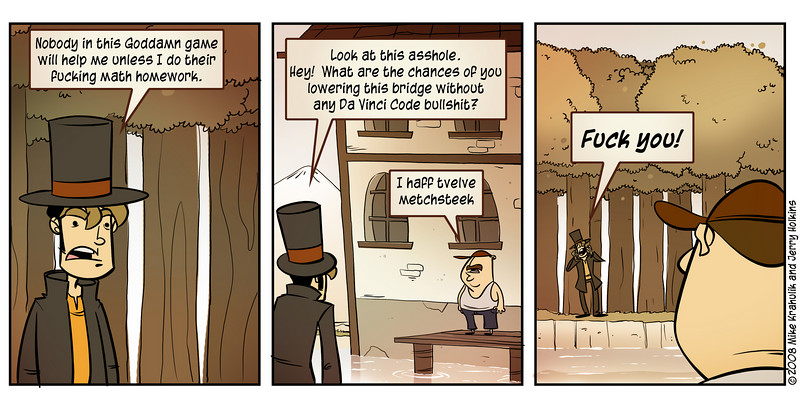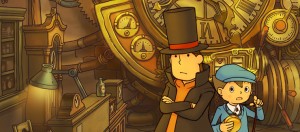Finished the most recent Professor Layton game last night. Professor Layton and the Unwound Future is the third in a series that I like to describe as “a Sherlock Holmes-like story connecting the types of logic puzzles in e-mails your grandmother would send you.” It’s not a flattering description, but it’s true. Penny Arcade sums it up in a comic about the first game:
Pardon the language.
Anyway, as I played through the game, several random thoughts went through my mind. I thought it might be fun to just list out a few that I can remember and let you come to your own conclusions. So here they are! (very minor spoilers present)
- This is a story about traveling ten years into London’s future. In the previous games there’s always a big give-away that culminates in grounding the more extreme fantastic elements in the real world. It’s going to be hard for them to ground time travel in the real world.
- The action in this game reminds me of The Castle of Cagliostro. What a great movie!
- The production values in this game are really great. Sure, it has talking heads, but it knows what moments to emphasize and really plays them up by adding voice or fully animating the conversations.
- Level-5 are the best game developers left in Japan.
- I can’t tell if this game is just easy or if finishing the first two games in the series has prepared me for the type of critical thinking present in the Laytonverse, but I haven’t spent more than a few minutes on any single puzzle yet. I have to admit they’ve all been enjoyable.
- Why did they decide to animate the scene when you meet the talking bee for the second time?
- Why did they introduce the talking bee twice only to kill it off and replace it with another (better) character?
- These animated cutscenes are really great. I don’t really watch anime any more, but I would watch a Professor Layton anime any day. (Note: There is one in Japan, but it hasn’t been released in America yet)
- There are way too many people to talk to that don’t actually have puzzles for you. I wish there was a way to tell at a glance if someone has a puzzle for you. It seems to run at about 50/50 at the moment.
- There’s an interesting moment about mid-way through the game where you run into a statue that looks similar to Layton and his apprentice Luke. I didn’t read it as closely as I should have, but the impression that I got was that the story in the Layton games are being framed at a meta-level as the story a father is telling to his son Luke. It never came back up outside of that one moment, but if the games begin to take this metaphor and make it more pronounced it could add some depth to the stories.
- According to the clock I’ve put 13 hours into this game. It feels more like half that.
- This (optional) parrot delivery mini-game is way too hard! It’s a great concept though.
- The (optional) toy car mini-game is really fun. I feel like it could almost be a standalone game.
- The (optional) storybook mini-game is outstanding, but I wish there was something that indicated where to find the remaining pieces of the book. I can’t find any more puzzles!
- This might be my favorite Layton game from a gameplay standpoint and it probably has the best pacing. If I have any complaints it’s simply that we’re on a third game in a world populated by people whose sole mode of interaction is harassing you with puzzles (see the comic above). The first game tried to justify it by setting itself in a “curious village”, the second game touched on it a bit but then kind of brushed it off, and this game just assumes that your suspension of disbelief is worn down by now. I guess what I’m saying is I miss the moments in the first game where you really feel the ridiculousness of the Laytonverse, where someone will ask you to figure out the ages of their daughters in exchange for the location of a building you’re trying to find. Now that it’s gone it’s impossible to get that feeling back, but it’s something I really miss about my introduction to the series.
- Oh, so that’s how they grounded the time travel in the real world. It’s what I expected, and it’s happily even less believable than actual time travel. I’m glad it allowed for a climax of sufficient grandeur.
- Oh man, I’m so tired. I keep falling asleep during the ending. I’m going to have to finish this again later to catch what I miss. Elliott needs to stop waking up at 6:30AM.
- How can a trilogy end by introducing more questions?
So ultimately I loved the game, but it’s more of the same. As long as these things continue to keep me interested long enough to add them to my completion log I guess I’m ok with that.


